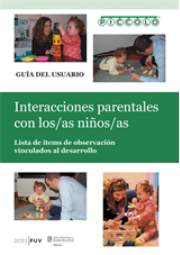Detail
A tool to improve children's cognitive development
In what skills are parent’s most proficient in? How can we encourage them to better support children’s cognitive, social and language development? We can find it out in no time with PICCOLO, the direct observation tool designed to assess and control the quality of parent-children interactions. PICCOLO. Parenting Interactions with Children: Checklist of Observations Linked to Outcomes is a resource created by researchers from the United States which has been adapted and validated in Spain by a research team led by lecturers Rosa Vilaseca and Magda Rivero, from the Department of Cognition, Development and Educational Psychology of the UB.
Created in order to be used by parents and children aged 1-3, PICCOLO measures twenty-nine supportive parenting behaviours in four domains: affection, responsiveness, encouragement and teaching. This is a tool to assess what parenting behaviours work better to develop individual interventions to help parents in this task and to monitor the positive results of the supportive parenting program. The tool is based on the results of different research studies and has been assessed through the use of longitudinal data and observations of videos from the files of the Early Head Start Research and Evaluation Project, as well as other video observations and other research studies carried out by the same authors.
This tool includes a guide for the user, which provides help to the professional who wants to assess the parenting interactions. It offers guidelines to find out how to start, the length of an observation, what kind of activities should be carried out in order to make observations; advice to help families feel comfortable during the observations, how to give the marks, how to interpret them and how to share them with the families. The guide includes recommendations on how to user PICCOLO with children with disabilities, apart from adding a battery of answers to frequently asked questions professionals might ask when using PICCOLO, such as dealing with the influence of the observer’s subjectivity during the sessions if, for instance, s/he has met the family before.
The team is built up by Rosa Vilaseca and Magda Rivero, lecturers at the Department of Cognition, Development and Educational Pscyhology of the UB, and they are the co-directors of the master’s degree of Professional Practice in Early Care of the UB; Rosa M. Bersabé, lecturer at the Department of Methodology of Behavioural Sciences of the University of Malaga; Esperanza Navarro-Pardo and María José Cantero, lecturers at the Department of Evolutionary and Educational Psychology of the University of Valencia; Fina Ferrer, doctor in Clinical Psychology and Health and collaborator of the master’s degree in Professional Practice in Early Care of the UB; and Clara Valls-Vidal, lecturer at the Department of Psychology of the Abat Oliba University.



